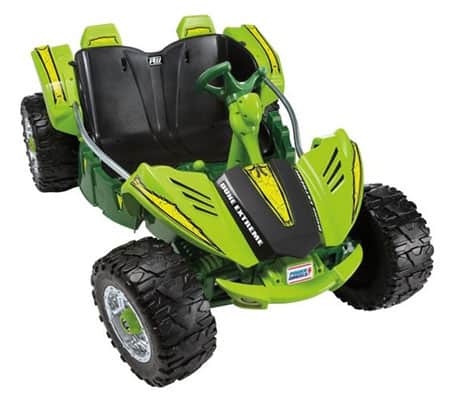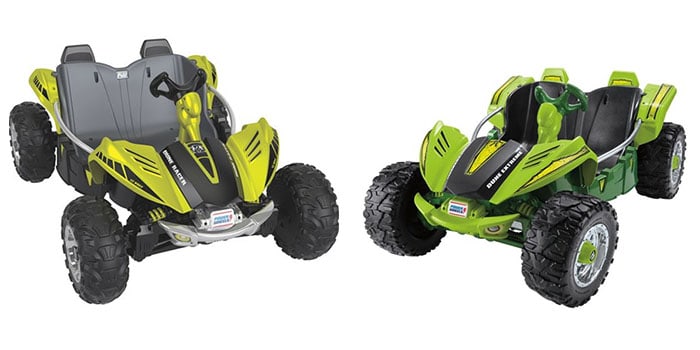In this article, we compare the Power Wheels Dune Racer vs Dune Racer Extreme. Both can be an awesome choice if you want to treat the young driving fan in your family to a two seater electric dune buggy, designed for safety with kids in mind.
But, although they share most of the same mechanical and electrical components, there are some differences between the two models. So which one is the best?
Our guide below will help you find which is the most suitable ride on for your kids. First we’ve got a quick comparison table of the key features of the Power Wheels Dune Racer vs Extreme.
Then we look at the main differences between them and the advantages of each ride, in turn. Finally, we’ll summarize the pros and cons of both Racers, to help you make the right choice for your kids.
Power Wheels Dune Racer vs Dune Racer Extreme – Quick Comparison
In the table below we have summarized the main features of each model in a side by side comparison.
Note: the only difference in these main features is the type of tires – but there are some other differences which we will review in more detail below the table.
| Power Wheels Dune Racer | Power Wheels Dune Racer Extreme | |
|---|---|---|
 |  | |
| Description | Electric two seater dune buggy for young kids | Electric two seater dune buggy for young kids |
| Age Range | 3-7 | 3-7 |
| Weight Limit | 130 lbs | 130 lbs |
| Top Speed | 5 mph | 5 mph |
| Price | See at Amazon | See at Amazon |
| Battery System | 12V 9.5A gray sealed battery - charger included | 12V 9.5A gray sealed battery - charger included |
| Battery Life | 1 to 3 hours, depending on kids weight and terrain | 1 to 3 hours, depending on kids weight and terrain |
| Battery Recharge Time | 14 hours | 14 hours |
| Throttle | Foot pedal - stops if you take your foot off the pedal | Foot pedal - stops if you take your foot off the pedal |
| Safety Belt | No | No |
| Frame | Steel box frame for extra strength | Steel box frame for extra strength |
| Seats | Molded plastic, not adjustable | Molded plastic, not adjustable |
| Tires | Plastic tires | Extra-Wide plastic tires. Same as on the Power Wheels F150 truck |
| Product Weight | 68 lbs | 68 lbs |
| Assembled Dimensions | 35" W x 52" L x 24" H | 35" W x 52" L x 24" H |
| Assembly Time | 1 to 2 hours | 1 to 2 hours |
Main Differences
As you can see from the table above, both have extremely similar specifications but they do differ in some areas.
The biggest difference between both models is that the Power Wheels Dune Racer Extreme has wider tires than the regular Dune Racer – the Extreme uses the same oversized tires as the more expensive Power Wheels F150 truck.
The Dune Racer Extreme also has a cover underneath it to better protect the electrics, and squared rear fenders whereas the regular Dune Racer has rounded fenders.
There are also cosmetic variations in color. For example, the green Dune Racer has a chrome-look front brush bar and black steering wheel, headrests and lower chassis. Whereas the green Dune Racer Extreme has a green front brush bar and green steering wheel, headrests and lower body.
Advantages of Dune Racer
The Dune Racer was our choice of Best Two Seater for young ones when we reviewed the top go karts for kids in 2024 recently.
But there aren’t many advantages compared to the Extreme as they are so similar in specification:
- The price is sometimes less than the Extreme, but check the actual price below
- Some people may prefer the look of the cosmetic color differences compared to the Extreme
- Replacement wheels are usually cheaper than the Extreme
Advantages of Dune Racer Extreme
Likewise, the Extreme doesn’t have too many advantages over the regular Dune Racer:
- MSRP (Manufacturer’s Suggested Retail Price) is about $30 cheaper than the regular Dune Racer – but check the actual price below as they often vary
- The extra wide plastic tires may provide better traction on hard surfaces (but may also be noisier as there is more surface area in contact with the ground).
Pros of Both Dune Racers
Here is a summary of what is great about both Dune Racer models:
- Two seater for twice the fun!
- Kids dune racer designed for little ones – maximum total weight capacity of 130 pounds
- Two forward speeds (5 or 2.5 mph) – parents can easily lock out the top speed for little ones or beginners
- Reverse gear – makes it easy to maneuver in tight spaces
- 1 to 3 hours running time per full charge – longer than many rivals
- Easy to recharge the battery using house electric supply
- Auto brakes – aid safety by stopping the Racer immediately when you take your foot off the accelerator pedal
- Fast enough to be exciting for young children
- Slow, stable and low enough to minimize the risk of rolling or being thrown off
- Secret storage compartment under the hood
- Power Wheels is a brand name of Fisher-Price (part of Mattel, the famous US toy company). Replacement and spare parts are readily available from their service centers and online
Cons of Both Dune Racers
Here is a summary of what is not so great about both Dune Racer models:
- The ‘Monster Traction’ (hard plastic tires) can handle grass or dirt ok but are a rough ride on hard surfaces, compared to rubber tires.
- Plastic tires are noisier than rubber and may wear out quite quickly on concrete
- Battery recharge time is a minimum of 14 hours so charging needs to be planned (but a long recharge time is common for electric go karts)
- No headlights or rear lights so can only be used safely during daylight
- Not intended for use on public roads or sidewalks (like all go karts aimed at young kids)
- Must be stored in a dry area, due to the electrical components
- Might be too wide (35″) to fit easily through some doorways if storing in a garage or outbuilding
- Battery should be recharged at least once a month to keep it fully operational
Conclusion
Both these Racers are a great choice of ride on buggy for 3 to 7 year olds – because they are two seaters, a friend can safely enjoy the ride too.
For a guide as to size, many users suggest a child height of 36″ to 54″ is a suitable height range to be able to fit in the vehicle and operate it easily. Check out the video below to see a Dune Racer in action, with kids aged 4 and 6 driving:
So which Dune Racer model is best? Unless you prefer a particular color then the ideal choice really depends on price, availability and which size of tires you need.
The wider tires on the Extreme should provide better traction on grass, but they may be even noisier on concrete and are usually more expensive to replace (around $35 each vs roughly $25 on the regular model)
If the prices of both models were the same, we’d choose the Dune Racer Extreme if using mostly on grass/dirt and the regular Dune Racer if using mostly on concrete or other hard surfaces.
Owner’s Manuals
The Power Wheels Dune Racer manual is available in PDF format from Mattel here.
The Power Wheels Dune Racer Extreme manual is available in PDF format from Mattel here.
NOTE: A parent’s decision to allow their child to ride either the Power Wheels Dune Racer or the Power Wheels Dune Racer Extreme should depend on the child’s age, size and maturity.

